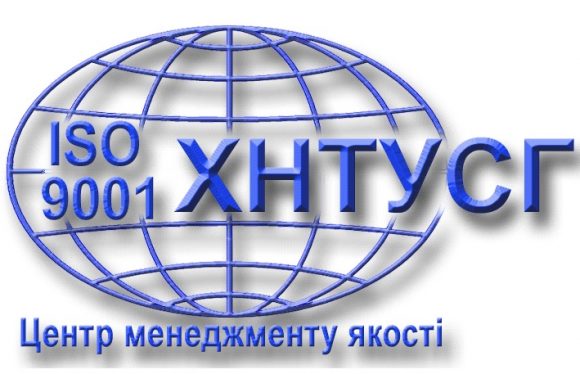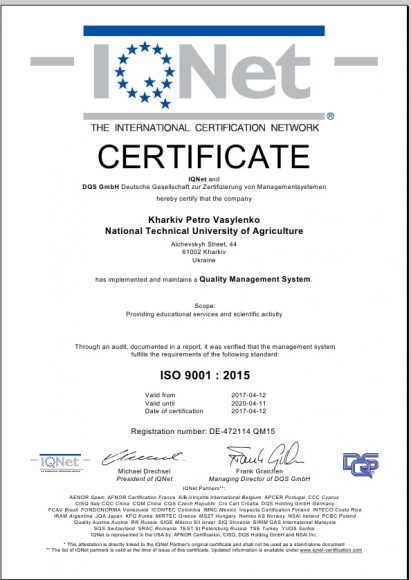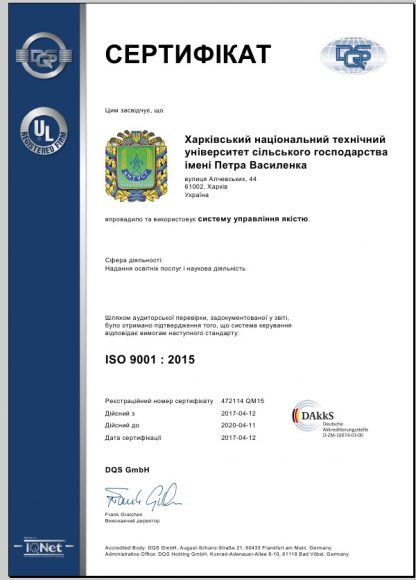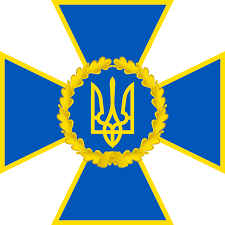 | The Quality Management Center was established on January 1, 2010 (order of KhNTUA №01-08 / 331 of December 30, 2009) to develop, maintain, improve and develop the quality management system of the university, which is a tool to ensure implementation of the Mission, Vision, Goals and Policies of the University in order to increase the satisfaction of consumers of educational services and research. |
| The main areas of work: − development and improvement of the quality management system, ensuring its effectiveness, relevance and effectiveness (according to the plan); – ensuring compliance of the quality management system with ISO 9001: 2015 standards, etc .; – popularization of approaches to quality assurance, involvement and training of university staff, introduction of risk-oriented thinking; – conducting internal audits of quality management system processes, preparation, organization and support of external audits (relevant plans); – monitoring of process indicators (monitoring table); – analysis and review of process indicators (including ratings, SWOT-analysis of the state of the university, implementation of the Strategy, Policy, quality management system, etc.); – analysis of risks and risk factors for the provision of educational services and research and their minimization (tables of risks and risk factors); – process monitoring (analysis report); – analysis and improvement of processes, structure and quality management system in general (analysis report); – documentation management (including constant updating of models and methods of processes, documents of the quality management system – plan for reviewing QMS documents); – benchmarking for the quality management system (including the latest developments, standards, recommendations, approaches, methodology, management tools). | |
General information about the quality management system
In pursuance of the Law of Ukraine “On Higher Education”, the university has been successfully operating, developing and improving the quality management system in the field of educational services and research for 10 years.
The system is certified in accordance with international standards ISO 9001:2015.
 |  |
Quality Management System (QMS) , based on the philosophy of TQM (Total Quality Management) and meets the requirements of international standards ISO 9001: 2015, ISO 19011 : 2012, ISO / IES17021: 2015, models of excellence EFQM (European Foundation for Quality Management), Standards and Recommendations for Quality Assurance in the European Higher Education Area (ESG), yes the main tool for managing the activities of KhNTUA.
- QMS KhNTUA implements the principles of ISO.
- KhNTUA QMS is based on the Deming cycle, RADAR logic and EFQM perfection model concepts.
The processes of measurement, analysis, improvement of QMS KhNTUA provide monitoring, analysis and risk assessment, maintenance of relevance, novelty of approaches and compliance of the university with the current level of educational services and research.
- QMS KhNTUA is built on the logical chain of implementation of the Mission – Vision – Policy – Strategy – University goals in ensuring the effectiveness of the university with quality assurance of educational services and research on the balance of interests of all stakeholders and risk assessment and minimization.
- Planning and implementation of quality management system processes is carried out to ensure the transformation: “Requirements and expectations of stakeholders – stakeholder satisfaction.”
- QMS KhNTUA provides optimal interaction of structural units of the university within the existing processes and efficient use of resources.
- Within the framework of the quality management system of KhNTUA the following is carried out:
– monitoring and comprehensive analysis of the effectiveness and efficiency of the QMS in general and all aspects of the university, analysis of the context of the university, taking into account the needs, expectations and satisfaction of all stakeholders;
– annual review of the Mission, Vision, Strategy, Policy and Goals of the University (clarification if necessary);
– analysis and review of the structure of processes necessary for the functioning of the university, the implementation of the Mission, Vision, Strategy, Policy and Goals on the balance of interests of all stakeholders;
– establishing the sequence and interaction of processes;/span>
– dentification of criteria and approaches necessary to ensure the effective management of the university and these processes on the balance of interests of all stakeholders and risk assessment and minimization;
– ensuring the availability of resources for the functioning of processes;
– analysis of opportunities, as well as risks and actions to prevent and minimize them;
– obtaining information necessary for the functioning and monitoring of processes;
– use of measures necessary to achieve the planned results, create conditions and implement measures and actions to improve these processes.
The essence of approaches to building and developing a quality management system for the implementation of the Mission, Strategy and improving the management of KhNTUA is to improve, build and expand functions and procedures in accordance with the requirements of standards, taking into account changes, new standards, tools and management models.
![]() Principles of the university quality management system.
Principles of the university quality management system.
![]() Tools university quality management system.
Tools university quality management system.
Tools of the certified innovative system of successful development.

